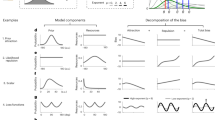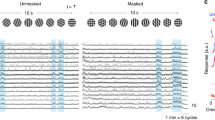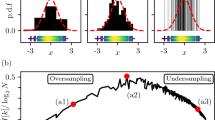Abstract
Gregory and Cane1 have proposed a statistical information theory of visual thresholds which derives the empirical laws governing absolute and differential visual thresholds from certain plausible assumptions about the properties of the eye as a detector of visible radiation. An essentially similar theory was restated and elaborated by Cane2 in a later paper.
This is a preview of subscription content, access via your institution
Access options
Subscribe to this journal
Receive 51 print issues and online access
$199.00 per year
only $3.90 per issue
Buy this article
- Purchase on Springer Link
- Instant access to full article PDF
Prices may be subject to local taxes which are calculated during checkout
Similar content being viewed by others
References
Gregory, R. L., and Cane, V., Nature, 176, 1272 (1955).
Cane, V., J. Roy. Statist. Soc., B, 18, 177 (1956).
Hartline, H. K., Amer. J. Physiol., 130, 690 (1940).
Hartline, H. K., Amer. J. Physiol., 130, 700 (1940).
Author information
Authors and Affiliations
Rights and permissions
About this article
Cite this article
MARRIOTT, F. A Theory of Visual Thresholds. Nature 181, 1487–1488 (1958). https://doi.org/10.1038/1811487a0
Issue Date:
DOI: https://doi.org/10.1038/1811487a0
This article is cited by
-
Theory of the Visual Threshold
Nature (1961)
Comments
By submitting a comment you agree to abide by our Terms and Community Guidelines. If you find something abusive or that does not comply with our terms or guidelines please flag it as inappropriate.



